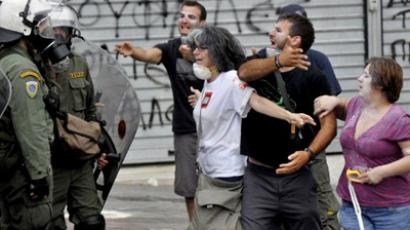Greeks seek rural salvation from crisis

Most populations today surge into cities in search of jobs and money, but in Greece it seems the countryside is where fortunes can be furrowed. Greeks are moving out of the metropolis in a bid to survive the financial crisis their country is facing.
Greece is reverting to an agricultural economy – and farming is one the few remaining profitable industries. With apple, grape, olive and cherry orchards practically everywhere, the rural life is bountiful.Avra Panousopoulou has known this for decades. She picks her own fruit and uses it for her deli business.Her workshop in the village Agia is practically a big kitchen, and the work is like cooking for a very big family – something she does anyway. With her house right above the shop, she can never be late for work and she would not change this for anything a city could offer.Many people, tired of bottling up their frustrations in the city, are making the same choice Avra did by leaving her life in Athens.“Since we have the crisis, there are many people who leave and go back to the houses they have in small villages and they try to find new jobs,” she explains.Pickled vegetables and marmalades have given Avra a chance to raise her kids and live her life the way she wants. But most Greeks are simply in a jam.“A very large percentage of people have lost their jobs, especially young people are almost desperate. I teach young people to become architects, and I’m afraid that I cannot tell them what the truth will be – that they will not find jobs,” regrets Stavros Stavrides, professor of architecture at the National Technical University in Athens.Statistics show that nearly 1 million people have lost their jobs, and the figures are only expected to rise. With over 40 per cent of people under the age of 24 out of work, any job is in demand.Now quiet villages like Agia are rapidly becoming the proverbial silver lining of the dark debt cloud that continues to loom over Greece.














